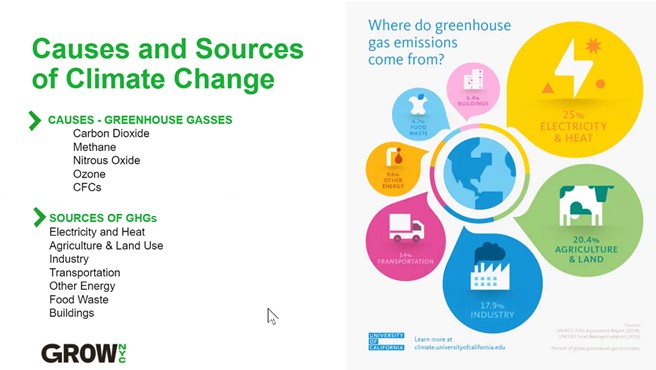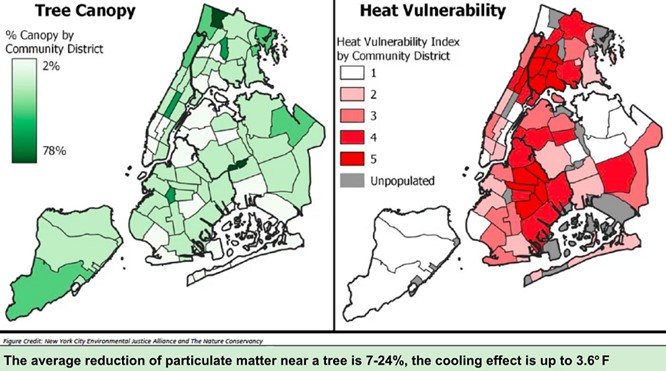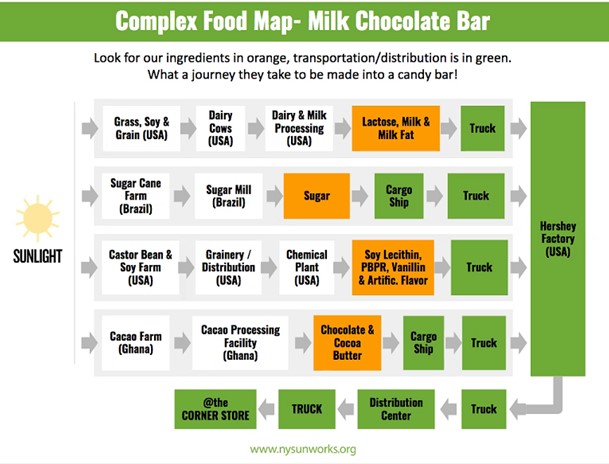
 Department of Design and Construction311
Department of Design and Construction311 Search all NYC.gov websites
Search all NYC.gov websites
DDC STEAM Celebrates Earth Week
Earth Week was celebrated across the globe from April 19th to April 23rd, 2021. The NYC Department of Design and Construction’s STEAM Initiatives unit participated in the NYC Department of Education’s (DOE) Office of Sustainability Professional Learning Earth Week webinars. Throughout the week, the Office of Sustainability offered virtual training workshops focused on various aspects of the crisis emanating from climate change and its impact the earth.

On April 19th, 2021, the STEAM Team participated in the Green Spaces workshop with educators, representatives of community environmental justice organizations, and informal educators who provide STEAM outreach and student advocacy programming. Lisa Bloodgood, the Director of Advocacy and Education at the Newtown Creek Alliance, discussed the importance of greens spaces in urban communities and densely populated cities like New York.
Ms. Bloodgood emphasized that as a matter of equity and justice, New York City residents in all communities would ideally have access to a community park every 5 miles. However, due to the lack of available open areas in NYC, minimal green spaces have been created. Without the efforts of New York City agencies to introduce bioswales, green roofs, and green spaces into communities with poor air quality and a high urban heat indexes, there would be even fewer opportunities to address the harm caused by climate change. Extreme heat is an effect of climate change and according to an article published by the U.S. Geological Survey, currently New York City loses an average of 13 residents each year to heatstroke. Urban heat hotspots throughout NYC are caused by the impervious materials that have traditionally been used to build, which absorb solar radiation rather than reflect it. Queens, Brooklyn, and the Bronx are seeing higher temperatures compared to Manhattan and Staten Island which have larger open green spaces.

The addition of green infrastructure like bioswales, green roofs and trees in communities like Newtown Creek will provide cooling and cleaner air. The Newtown Creek Alliance (NCA) advocates for sustainability initiatives in the communities of north Brooklyn and Queens. NCA has partnered with Riverkeeper and Perkins+Will to create the Newtown Creek Vision Plan to propose projects that will restore and revitalize public spaces. The projects fall in line with proposed ideas such as the creation of a park over the Brooklyn-Queens Expressway and green spaces along the Dutch Kills Loop in industrial Long Island City, Queens. Another organization that is promoting change in New York City is GrowNYC.
GrowNYC is a program that along with City Harvest and NYC Community Fridges, provide food rescue solutions and delivers food to more than 2 million New Yorkers that face hunger, including more than one in four NYC children.
On April 21st, Kate Wimsatt and Jackie Junttonen, Director and Outreach Coordinator at GrowNYC, highlighted their Zero Waste School initiative that teaches students the connection between food, waste, and climate change by educating them on how to recycle, reduce food waste, and the difference between sustainable and industrial farming.
Ms. Wimsatt and Ms. Junttonen noted that on a global scale $4,750 billion worth of food is lost or wasted each year. Americans discard 219 lbs of waste per person each year, which is 30-40% of the US food supply. Food waste is responsible for 6% of global greenhouse gas emissions.
To address these issues, GrowNYC has launched various programs within the community to educate and provide alternatives to food waste. Programs include greenmarkets throughout the city that provide fresh food boxes filled with healthy locally grown produce. They have also created a recycling program, community gardens, and educational programs that foster environmental stewardship. GrowNYC partners with schools to create Green Teams where students promote sustainable changes in the school, community, and at home.
To conclude Earth Week, on April 23rd, Hannah Jaris and Elaine Blanck from New York Sun Works discussed food production, and the resources and energy used to transport food to local supermarkets and grocery stores. New York Sun Works is a non-profit organization that builds hydroponic farming technology in schools to endorse their Greenhouse Project Initiative that educates students and teachers about the science of sustainability.
Ms. Jaris and Ms. Blanck asked the following question: do you know where your fruits and vegetables come from? The answer is some are grown locally, others nationally, and some come from other countries. The amount of energy used to transport the food we buy at grocery stores travel miles through various forms of transportation that emit greenhouse gases into the atmosphere.

America’s current farming method is industrial farming which is used to produce massive crop yields. Almost 80% of the nation’s food is produced by industrial farms. Large ecological footprints are caused by the distribution of goods and produce. New farming methods to reduce gas emissions and produce food that lasts longer reducing the need for extensive length of time for transport have been developed over the years. New York Sun Works promotes eco-friendly farming methods by installing small organic hydroponic science labs in schools. As part of their program, facilitators educate students about where their food comes from, mapping food production from farm to grocery store, and how hydroponic farming reduces the energy used to transport food from different countries and even from other states.
Participants of the NYC DOE Office of Sustainability’s Earth Week Program gained an understanding of the effects a thriving city can have on the environment and the impact of climate change. Educators were provided resources and access to curricula to incorporate climate change education in the classroom so that students can learn about the importance of protecting the earth and becoming sustainable innovators and guardians of the environment and our collective future.
About the NYC Department of Design and Construction
The Department of Design and Construction is the City’s primary capital construction project manager. In supporting Mayor de Blasio’s long-term vision of growth, sustainability, resiliency, equity and healthy living, DDC provides communities with new or renovated public buildings such as such as firehouses, libraries, police precincts, and new or upgraded roads, sewers and water mains in all five boroughs. To manage this $14 billion portfolio, DDC partners with other City agencies, architects and consultants, whose experience bring efficient, innovative and environmentally-conscious design and construction strategies to City projects. For more information, please visit nyc.gov/ddc


